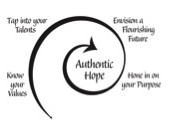
This article draws on Heidegger’s philosophy to bring a phenomenological perspective to bear on the question of place. By revealing dynamic human and natural histories, narrative can be a particularly useful tool for orienting our environmental commitments. I share stories from Vieques, Puerto Rico, an island shaped by trauma, to illustrate the power of people articulating what they most value about the places they call home.
Continue Reading
Abstract: Hope is a human process of discovery and perseverance that is based in personal values, a vision of the future, and a sense of purpose. This essay gives a brief overview on the role of phenomenological research in discovering the meaning of people’s lived experiences, such as the experience of hope. An example of phenomenological research on field ecologists’ lived experiences of climate change is provided in order to illuminate the experience of “silver linings” as the experience of hope while living in the midst of the dark cloud of climate change. An overview of a reflective curricular activity designed to cultivate hope and purpose in sustainability studies is provided.
Continue Reading
Drawing from a theoretical framework of Ecopsychology and Biophilia this phenomenological study explored the following research question; What is the meaning of the human-environment relationship for children? This qualitative investigation utilizes data from writing samples and follow up focus group interviews with 68 children providing a robust sample of 6-12 year olds perspectives. Qualitative data analysis software using QSR Nvivo ® 7 & 8 was used to systematically provide topic, analytic, matrix and categorical coding for the 265 pages of textual data. Results indicate that children have a love of nature; a positive deep-seated intellectual and emotional appreciation for nature based on “experiences through” and “affection for” nature. When children expressed their relationship with nature they often did so from a place of positive emotional friendship or unconditional love. This study provides a visual representative diagram based on quantifiable qualitative data illustrating the bonds between children and nature. The biophilic results show that children are “falling in love” with nature and this representation can provide a glimpse into the possibility of “standing in love” with nature as people grow into adulthood.
Continue Reading